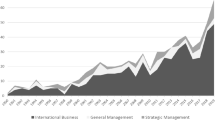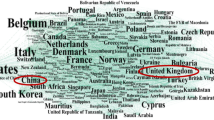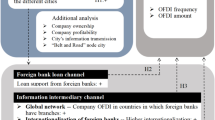Abstract
In this perspective paper we argue that outward foreign direct investment (OFDI) undertaken as escape response to perceived misalignment between firm needs and home country institutional conditions represents an important but under-explored phenomenon in the international business (IB) literature. We propose that, in advanced industrialized nations, the extent of OFDI as escape is likely to rise with the extent of societal coordination in the political economy. Societal coordination is associated with relatively slower rates of institutional adjustment and thus with relatively greater prevalence of misalignments that may drive OFDI. We illustrate the face validity of our argument and lay out the implications for future research in IB.

Similar content being viewed by others
Notes
These distributional consequences are partially related to market opening attendant to globalization, which tends to result in gains for mobile production factors and losses for immobile production factors (Frieden, 1991).
In the advanced industrialized nations there are normally no restrictions on OFDI. Where such restrictions exist, OFDI could of course be illegal, and might be labeled as ‘capital flight’.
This work is published as a Max Planck Institute for the Study of Societies Discussion Paper. According to the Institute, these papers ‘are refereed scholarly papers of the kind that are publishable in a peer-reviewed disciplinary journal. Their objective is to contribute to the cumulative improvement of theoretical knowledge.’ The paper is available for download at http://www.mpifg.de.
Daniel Kahneman received the prize jointly with Vernon L. Smith. Kahneman's co-author, Amos Tversky, could not share the honor because of his untimely death in 1996.
References
Abrahamson, E. (1996) ‘Management fashion’, Academy of Management Review 21 (1): 254–285.
Abrahamson, E. and Fairchild, G. (1999) ‘Management fashion: lifecycles, triggers, and collective learning processes’, Administrative Science Quarterly 44 (4): 708–740.
Aguilera, R.V. and Jackson, G. (2003) ‘The cross-national diversity of corporate governance: dimensions and determinants’, Academy of Management Review 28 (3): 447–465.
Albert, M. (1993) Capitalism Vs. Capitalism: How America's Obsession with Individual Achievement and Short-Term Profit Has Led It to the Brink of Collapse, Four Wall Eight Windows: New York.
Amable, B. (2003) The Diversity of Modern Capitalism, Oxford University Press: Oxford.
Anderson, P. (1999) ‘Complexity theory and organization science’, Organization Science 10 (3): 216–232.
Arthur, W.B. (1994) ‘On the Evolution of Complexity’, in G.A. Cowen, D. Pines and D. Meltzer (eds.) Complexity: Metaphors, Models, and Reality, Addison-Wesley: New York, pp: 65–81.
Axelrod, R.M. (1984) The Evolution of Cooperation, Basic Books: New York.
Bandura, A. (1977) Social Learning Theory, Prentice Hall: Englewood Cliffs, NJ.
Barr, P.S. (1998) ‘Adapting to unfamiliar environmental events: a look at the evolution of interpretation and its role in strategic change’, Organization Science 9 (6): 644–669.
Barr, P.S. and Huff, A.S. (1997) ‘Seeing isn’t believing: understanding diversity in the timing of strategic response’, Journal of Management Studies 34 (3): 337–370.
Baumgartner, F.R. and Jones, B.D. (2002) ‘Positive and Negative Feedback in Politics’, in F.R. Baumgartner and B.D. Jones (eds.) Policy Dynamics, Chicago University Press: Chicago, pp: 3–28.
Berg, D.M. and Guisinger, S.E. (2001) ‘Capital Flows, Capital Controls, and International Business Risk’, in A.M. Rugman and T.L. Brewer (eds.) The Oxford Handbook of International Business, Oxford University Press: Oxford, pp: 259–281.
Berger, S. (ed.) (1981) Organizing Interests in Western Europe, Cambridge University Press: Cambridge.
Berger, S. and Dore, R.P. (eds.) (1996) National Diversity and Global Capitalism, Cornell University Press: Ithaca, NY.
Boddewyn, J.J. and Brewer, T.L. (1994) ‘International-business political behavior: new theoretical directions’, Academy of Management Review 19 (1): 119–143.
Boyer, R. (1997) ‘French Statism at the Crossroads’, in C. Crouch and W. Streeck (eds.) Political Economy of Modern Capitalism: Mapping Convergence and Diversity, Sage Publications: London, pp: 71–101.
Buckley, P.J. and Castro, F.B. (1998) ‘The investment development path: the case of Portugal’, Transnational Corporations 7 (1): 1–15.
Casanova, L. (2004) ‘East Asian, European, and North American multinational firm strategies in Latin America’, Business and Politics 6 (1), (article 6).
Caves, R.E. (1996) Multinational Enterprise and Economic Analysis, 2nd edn, Cambridge University Press: Cambridge.
Cohen, M.D., March, J.G. and Olsen, J.P. (1972) ‘A garbage can model of organizational choice’, Administrative Science Quarterly 17 (1): 1–25.
Cyert, R.M. and March, J.G. (1963) A Behavioral Theory of the Firm, Prentice Hall: Englewood Cliffs, NJ.
Deutsche Bundesbank (1997) Entwicklung und Bestimmungsgründe grenzüberschreitender Direktinvestitionen [Developments and Causes of Foreign Direct Investment], Deutsche Bundesbank: Monatsbericht, Frankfurt.
DiMaggio, P.J. and Powell, W.W. (1983) ‘The iron cage revisited: institutional isomorphism and collective rationality in organizational fields’, American Sociological Review 48 (2): 147–160.
Dooley, K.J. and Van de Ven, A.H. (1999) ‘Explaining complex organizational dynamics’, Organization Science 10 (3): 358–372.
Dore, R.P. (2000) Stock Market Capitalism: Welfare Capitalism: Japan and Germany Versus the Anglo-Saxons, Oxford University Press: Oxford.
Dunning, J.H. (1981) ‘Explaining the international direct investment position of countries: toward a dynamic and development approach’, Weltwirtschafliches Archiv 117 (1): 30–64.
Dunning, J.H. (1996) Multinational Enterprises and the Global Economy, Addison-Wesley: Reading, MA.
Economist (2005) ‘China and the world economy: from T-shirts to T-bonds’, July 28, http://www.economist.com. (accessed 24 October 2005).
Eden, L. and Miller, S.R. (2004) ‘Distance matters: liability of foreignness, institutional distance and ownership strategy’, in M.A. Hitt and J. Cheng (eds.) Advances in International Management, Elsevier: New York, pp: 187–221.
Festinger, L. (1954) ‘A theory of social comparison processes’, Human Relations 7 (2): 117–140.
Frieden, J.A. (1991) ‘Invested Interests: the politics of national economic policies in a world of global finance’, International Organization 45 (4): 425–451.
Fulk, J. and DeSanctis, G. (1995) ‘Electronic communication and changing organizational forms’, Organization Science 6 (4): 1–13.
Gell-Mann, M. (1994) The Quark and the Jaguar, Freeman & Co: New York.
Gilovich, T., Griffin, D. and Kahneman, D. (2002) Heuristics and Biases: The Psychology of Intuitive Judgment, Cambridge University Press: Cambridge.
Gordon, R.H. and Hines Jr, J.R. (2002) ‘International taxation’, NBER Working Paper Series, NBER: Cambridge, MA.
Granovetter, M.S. (1985) ‘Economic action and social structure: the problem of embeddedness’, American Journal of Sociology 91 (3): 481–510.
Greenwood, R. and Hinings, C.R. (1996) ‘Understanding radical organizational change: bringing together the old and the new institutionalism’, Academy of Management Review 21 (4): 1022–1054.
Greenwood, R., Suddaby, R. and Hinings, C.R. (2002) ‘Theorizing change: the role of professional associations in the transformation of institutionalized fields’, Academy of Management Journal 45 (1): 58–80.
Guillén, M.F. (2005) The Rise of Spanish Multinationals: European Business in the Global Economy, Cambridge University Press: Cambridge.
Hall, P.A. (1993) ‘Policy paradigms, social learning, and the state: the case of economic policymaking in Britain’, Comparative Politics 25 (3): 275–296.
Hall, P.A. and Gingerich, D.W. (2004) ‘Varieties of capitalism and institutional complementarities in the macroeconomy: an empirical analysis’, MPIfG Discussion Paper 04/5, Max-Planck-Institut für Gesellschaftsforschung: Cologne.
Hall, P.A. and Soskice, D. (2001) ‘An Introduction to Varieties of Capitalism’, in P.A. Hall and D. Soskice (eds.) Varieties of Capitalism: The Institutional Foundations of Comparative Advantage, Oxford University Press: Oxford, pp: 1–68.
Hall, P.A. and Taylor, R.C.R. (1996) ‘Political science and the three new institutionalisms’, Political Studies 44 (4): 936–957.
Hayek, F.A. (1945) ‘The use of knowledge in society’, American Economic Review 35 (4): 519–530.
Hedberg, B. and Jönsson, S. (1978) ‘Designing semi-confusing information systems for organizations in changing environments’, Accounting, Organizations and Society 3 (1): 47–64.
Hennart, J.-F., Roehl, T. and Zeng, M. (2002) ‘Do exits proxy a liability of foreignness? The case of Japanese exits from the US’, Journal of International Management 8: 241–264.
Henisz, W.J. (2002) Politics and International Investment: Measuring Risks and Protecting Profits, Edward Elgar: London.
Hirschman, A.O. (1970) Exit, Voice, and Loyalty: Responses to Decline in Firms, Organizations, and States, Harvard University Press: Cambridge, MA.
Janis, I.L. (1982) Groupthink: Psychological Studies of Policy Decisions and Fiascoes, Houghton Mifflin: Boston, MA.
Johnson, G. (1988) ‘Rethinking incrementalism’, Strategic Management Journal 9 (1): 75–91.
Kahneman, D. and Tversky, A. (1979) ‘Prospect theory: an analysis of decision under risk’, Econometrica 47 (2): 263–291.
Kahneman, D., Slovic, P. and Tversky, A. (1982) Judgment under Uncertainty: Heuristics and Biases, Cambridge University Press: Cambridge.
Kauffman, S. (1995) At Home in the Universe, Oxford University Press: Oxford.
Keohane, R.O. (1984) After Hegemony: Cooperation and Discord in the World Political Economy, Princeton University Press; Princeton, NJ.
Kingdon, J.W. (1984) Agendas, Alternatives, and Public Policies, Little, Brown and Company: Boston, MA.
Kitschelt, H. (2003) ‘Competitive Party Democracy and Political-Economic Reform in Germany and Japan: Do Party Systems Make a Difference?’, in K. Yamamura and W. Streeck (eds.) The End of Diversity? Prospects for German and Japanese Capitalism, Cornell University Press, Ithaca, NY, pp: 334–363.
Knight, J. (1992) Institutions and Social Conflict, Cambridge University Press: Cambridge.
Kobrin, S.J. (1982) Managing Political Risk Assessment: Strategic Response to Environmental Change, University of California Press: Berkeley, CA.
Kostova, T. (1999) ‘Transnational Transfer of Strategic Organizational Practices: A Contextual Perspective’, Academy of Management Review 24 (2): 308–324.
Le, Q.V. and Zak, P.J. (2006) ‘Political risk and capital flight’, Journal of International Money and Finance 25 (2): 308–329.
Lewin, A.Y. and Kim, J. (2004) ‘The Nation State and Culture as Influences on Organizational Change and Innovation’, in M.S. Poole (ed.) Handbook of Organizational Change and Development, Oxford University Press: Oxford, pp: 324–353.
Lewin, A.Y. and Peeters, C. (2006) ‘Offshoring work: business hype or the onset of fundamental transformation?’ Long Range Planning 39 (3): 221–239.
Lewin, A.Y. and Stephens, C.U. (1993) ‘Designing Post-industrial Organizations: Combining Theory and Practice’, in G.P. Huber and W.H. Glick (eds.) Organizational Change and Redesign, Oxford University Press: Oxford, pp: 393–410.
Lewin, A.Y. and Volberda, H.W. (1999) ‘Prolegomena on coevolution: a framework for research on strategy and new organizational forms’, Organization Science 10 (5): 519–534.
Lewin, A.Y., Long, C.P. and Carroll, T.N. (1999) ‘The coevolution of new organizational forms’, Organization Science 10 (5): 535–550.
March, J.G. and Olsen, J.P. (1989) Rediscovering Institutions: The Organizational Basis of Politics, Free Press: New York.
March, J.G. and Simon, H.A. (1958) Organizations, New York: John Wiley & Sons.
Meyer, J.W. and Rowan, B. (1977) ‘Institutionalized organizations: formal structure as myth and ceremony’, American Journal of Sociology 83 (2): 340–363.
Müller, H. and Student, D. (2003) ‘Standortflucht: die Republik-Flüchtlinge [Flight to Other Locations: The Escapees from the Republic]’, Manager-Magazin 33 (12): 116–127.
Murmann, J.P. (2003) Knowledge and Competitive Advantage: The Coevolution of Firms, Technology, and National Institutions, Cambridge University Press: Cambridge.
Narula, R. (2002) ‘Innovation systems and ‘Inertia’ in R&D location: Norwegian firms and the role of systemic lock-in’, Research Policy 31 (5): 795–816.
Nelson, R.R. and Winter, S.G. (1982) An Evolutionary Theory of Economic Change, Belknap Press: Cambridge, MA.
North, D.C. (1990) Institutions, Institutional Change and Economic Performance, Cambridge University Press: Cambridge.
North, D.C. (1994) ‘Economic performance through time’, American Economic Review 84 (3): 359–368.
Oliver, C. (1991) ‘Strategic responses to institutional processes’, Academy of Management Review 16 (1): 145–179.
Olson, M. (1965) The Logic of Collective Action: Public Goods and the Theory of Goods, Harvard University Press: Cambridge, MA.
Orrù, M., Biggart, N.W. and Hamilton, G.G. (1997) The Economic Organization of East Asian Capitalism, Sage Publications: London.
Perez, C. (2002) Technological Revolutions and Financial Capital: The Dynamics of Bubbles and Golden Ages, Edward Elgar: London.
Porter, M.E. (1990) The Competitive Advantage of Nations, Free Press: New York.
Putnam, R.D. (1988) ‘Diplomacy and domestic politics: the logic of two-level games’, International Organization 42 (3): 427–460.
Redding, G. (2005) ‘The thick description and comparison of societal systems of capitalism’, Journal of International Business Studies 36 (2): 123–155.
Rogowski, R. (1989) Commerce and Coalitions: How Trade Affects Domestic Political Alignments, Princeton University Press: Princeton, NJ.
Ruggie, J.G. (1982) ‘International regimes, transactions, and change: embedded liberalism in the postwar economic order’, International Organization 36 (2): 379–415.
Rugman, A. and Verbeke, A. (1998) ‘Multinational enterprises and public policy’, Journal of International Business Studies 29 (1): 115–136.
Rugman, A.M. and Verbeke, A. (2004) ‘A perspective on regional and global strategies of multinational enterprises’, Journal of International Business Studies 35 (1): 3–18.
Salmon, K. (2001) ‘Spanish foreign direct investment, transnationals and the redefinition of the Spanish business realm’, International Journal of Iberian Studies 14 (2): 95–109.
Schmidt, V.A. (2002) The Futures of European Capitalism, Oxford University Press: Oxford.
Schmitter, P.C. and Lehmbruch, G. (eds.) (1979) Trends toward Corporatist Intermediation, Sage Publications: London.
Schoppa, L.J. (2006) Race for the exits: the unraveling of Japan's system of social protection, Cornell University Press: Ithaca, NY.
Simon, H.A. (1947) Administrative Behavior: A Study of Decision-Making Processes in Administrative Organization, Macmillan: New York.
Streeck, W. (2001) ‘Introduction: Explorations into the Origins of Nonliberal Capitalism in Germany and Japan’, in W. Streeck and K. Yamamura (eds.) The Origins of Nonliberal Capitalism: Germany and Japan in Comparison, Cornell University Press: Ithaca, NY, pp: 1–38.
Streeck, W. and Yamamura, K. (2003) ‘Introduction: Convergence or Diversity? Stability and Change in German and Japanese Capitalism’, in K. Yamamura and W. Streeck (eds.) The End of Diversity? Prospects for German and Japanese Capitalism, Cornell University Press: Ithaca, NY, pp: 1–50.
Tallman, S.B. (1988) ‘Home country political risk and foreign direct investment in the United States’, Journal of International Business Studies 19 (2): 219–234.
Thaler, R.H. (1991) Quasi Rational Economics, Russell Sage Foundation: New York.
Thaler, R.H. (1992) The Winner's Curse: Paradoxes and Anomalies of Economic Life, Princeton University Press: Princeton, NJ.
Thelen, K. (2004) How Institutions Evolve: The Political Economy of Skills in Germany, Britain, the United States, and Japan, Cambridge University Press: Cambridge.
Tsebelis, G. (1995) ‘Decision-making in political systems: veto players in presidentialism, parliamentalism, multicameralism, and multipartyism’, British Journal of Political Science 25 (3): 289–326.
Vernon, R. (1971) Sovereignty at Bay: The Multinational Spread of US Enterprises, Basic Books: New York.
Vernon, R. (1998) In the Hurricane's Eye: The Troubled Prospects of Multinational Enterprises, Harvard University Press: Cambridge, MA.
Volberda, H.W. (1998) Building the Flexible Firm: How to Remain Competitive, Oxford University Press: Oxford.
Weick, K.E. (1979) The Social Psychology of Organizing, Random House: New York.
Whitley, R. (1999) Divergent Capitalisms: The Social Structuring and Change of Business Systems, Oxford University Press: Oxford.
Williamson, O.E. (1985) The Economic Institutions of Capitalism: Firms, Markets, Relational Contracting., The Free Press; New York.
Yamamura, K. (2003) ‘Germany and Japan in a New Phase of Capitalism: Confronting the Past and the Future’, in K. Yamamura and W. Streeck (eds.) The End of Diversity? Prospects for German and Japanese Capitalism, Cornell University Press: Ithaca, NY, pp: 115–146.
Zaheer, S. and Mosakowski, E. (1997) ‘The dynamics of the liability of foreignness: a global study of survival in financial services’, Strategic Management Journal 18 (6): 439–464.
Acknowledgements
We thank Lorraine Eden for her patience and constructive editorial guidance, and the four anonymous reviewers for their insightful feedback. We are further grateful for comments on various versions of the paper received from Witold Henisz, Gordon Redding, Gabriel Szulanski, Douglas Webber, Eleanor Westney, and audience members at conferences including AIB, AOM, EGOS, the JIBS Frontiers Conference, and at faculty seminars at INSEAD and the INSEAD Euro-Asia and Comparative Research Center.
Author information
Authors and Affiliations
Corresponding author
Additional information
Accepted by Lorraine Eden, Departmental Editor, 11 March 2007. This paper has been with the author for three revisions.
Rights and permissions
About this article
Cite this article
Witt, M., Lewin, A. Outward foreign direct investment as escape response to home country institutional constraints. J Int Bus Stud 38, 579–594 (2007). https://doi.org/10.1057/palgrave.jibs.8400285
Received:
Revised:
Accepted:
Published:
Issue Date:
DOI: https://doi.org/10.1057/palgrave.jibs.8400285




